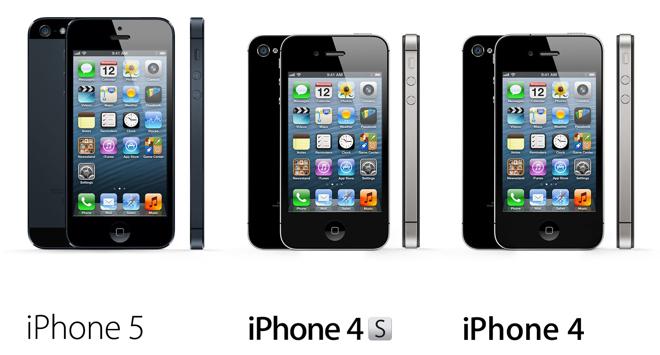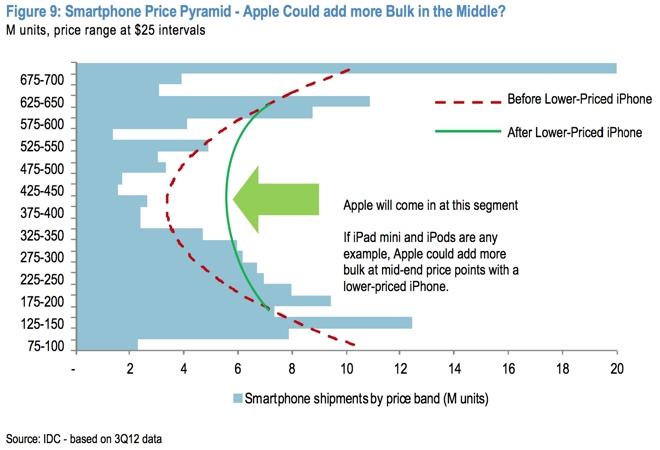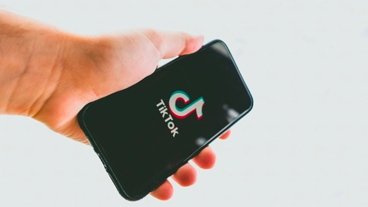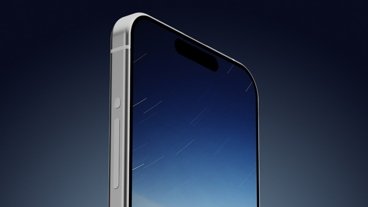Prohibitive carrier requirements made by Apple have prevented some 2.8 billion customers from having access to the iPhone, according to a new analysis.
The estimate comes from Horace Dediu of Asymco, who spoke with Bloomberg about Apple's untapped market potential. Among the biggest partners Apple has yet to strike a deal with are China Mobile, the largest carrier in the world, and NTT DoCoMo, Japan's largest mobile provider.
Apple's current iPhone lineup.
In contrast, Apple's chief rival Samsung has agreements in place with almost all of the world's 800 carriers, according to Dediu. According to him, Apple has "run out" of carriers that will agree to its conditions for carrying the iPhone.
Requirements imposed by Apple include sales quotas that can prove costly for carriers. The rules are said to be especially prohibitive for carriers that do not have a large number of subscribers that use costly data plans.
Market watchers have anticipated a deal between Apple and China Mobile for years, but the iPhone remains unavailable to the network with 715 million subscribers. While China Mobile is the largest carrier in the world, only 13 percent of its customers are on high-speed data plans, compared to 33 percent for rival China Unicom, and 44 percent for China Telecom.
The issues highlight the fact that there are large market segments — to the tune of 2.8 billion customers, by Dediu's estimate — that Apple does not currently serve with its existing iPhone lineup. That's helped to fuel speculation that Apple could be working on a low-cost iPhone that would appeal to customers who do not buy their handsets with contract subsidies.
In its report published on Monday, Bloomberg said once again that Apple is, in fact, developing a more affordable iPhone that could be introduced as soon as this year. The rumors are now accompanied by speculation that Apple could relax some of its existing terms in order to make the iPhone available to those customers that are currently out of reach.
One analysis from last week suggested that Apple would not offer a so-called "low-end" iPhone, but would instead target the mid-range segment of the current smartphone market. Mark Moskowitz of J.P. Morgan believes Apple could sell a new iPhone model priced between $350 and $400 — a price that would be "very attractive" for many consumers.
 Neil Hughes
Neil Hughes








-m.jpg)






 Chip Loder
Chip Loder
 Wesley Hilliard
Wesley Hilliard
 Marko Zivkovic
Marko Zivkovic

 Christine McKee
Christine McKee
 Amber Neely
Amber Neely

 Malcolm Owen
Malcolm Owen







53 Comments
What is with the obsession that every company (okay, just Apple really) should make every product line available to every market and every price point? I can't buy a diesel MINI Cooper D in Canada, and couldn't afford the turbocharged Cooper SD even if it was - but I'm perfectly happy with my naturally-aspirated petrol Cooper.
Why does Apple need a "new" low/medium cost iPhone. That's what the 4/4S is for. Apple isn't going to use cheap parts.
Yes, and the restrictive conditions are why the carriers can't pre-install crapware, block system updates, etc. like they can with Android and they could with old WinMo. The worst thing Apple could do would be to rescind their strict conditions to chase market share.
Potentially 2.8B new customers... and yet analysts claim market saturation.
That’s one side of the coin... The flip side: 2,8 bil. customers in the world could switch carriers in order to have access to Apple’s iPhone (which I believe to be happening in Japan and the States... I’m I wrong?).
I don’t now of many carriers currently crying about having regrets to have made a deal to get the iPhone. And I don’t remember a carrier anoucing that they would not continue selling the iPhone after having introduced it...